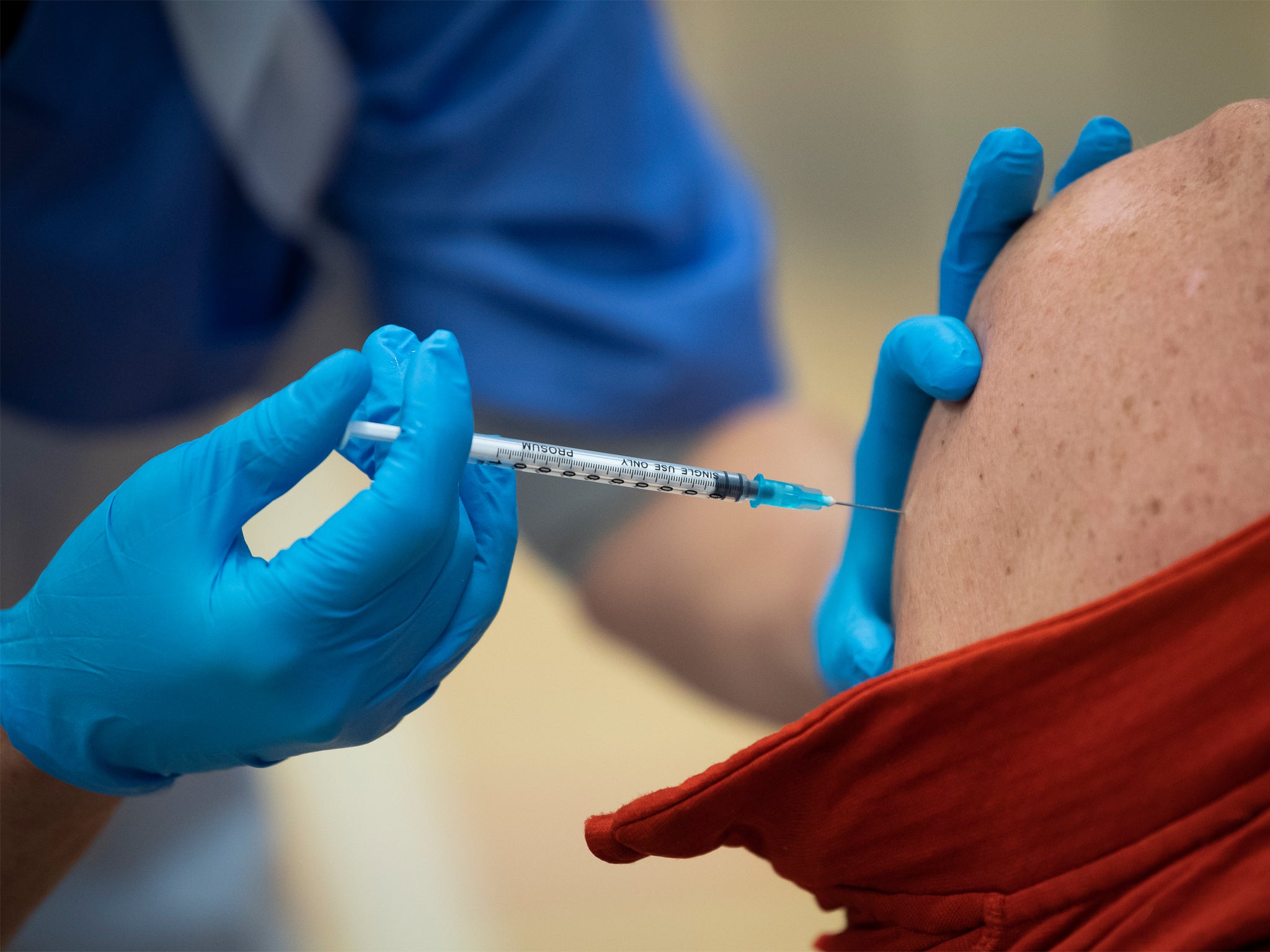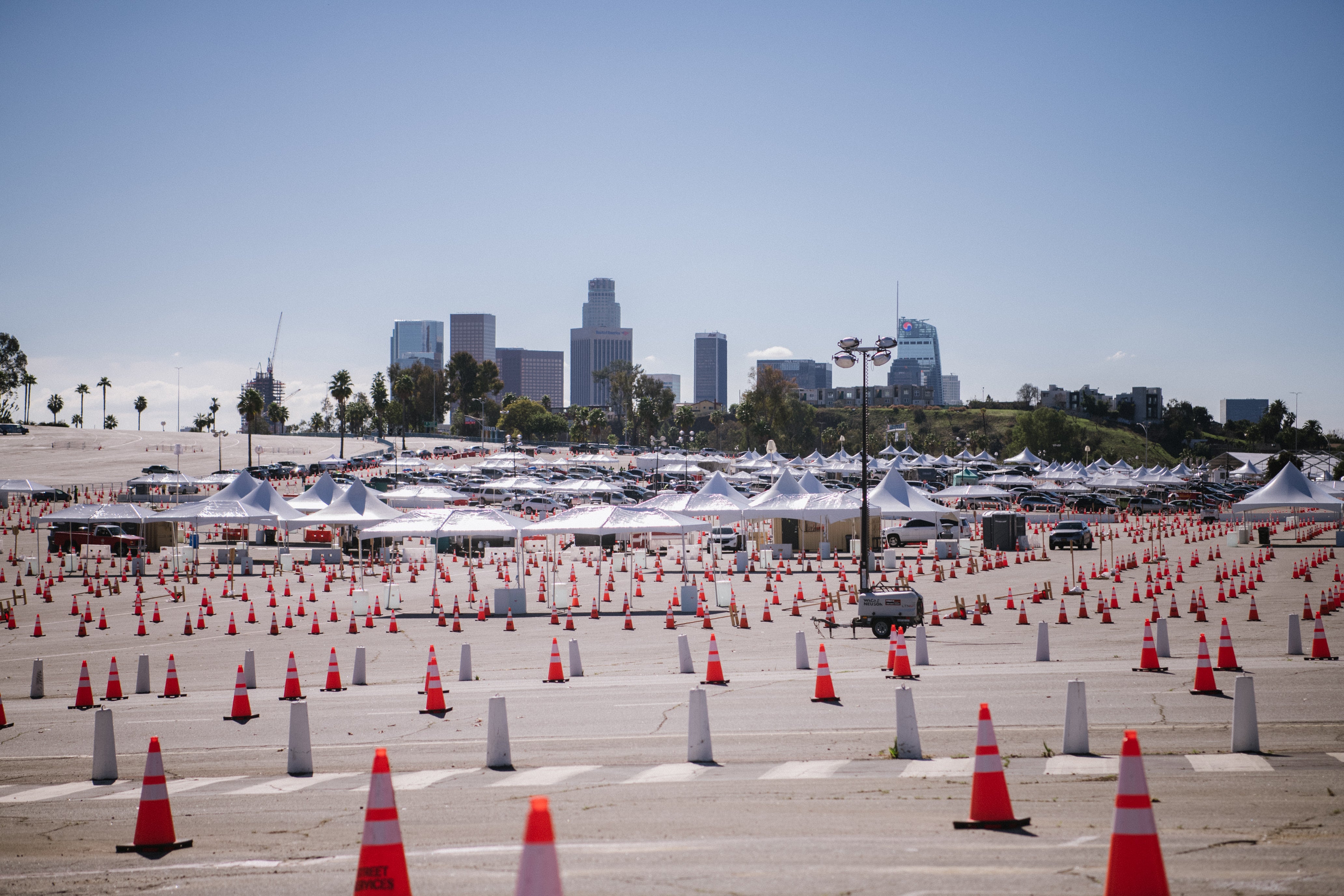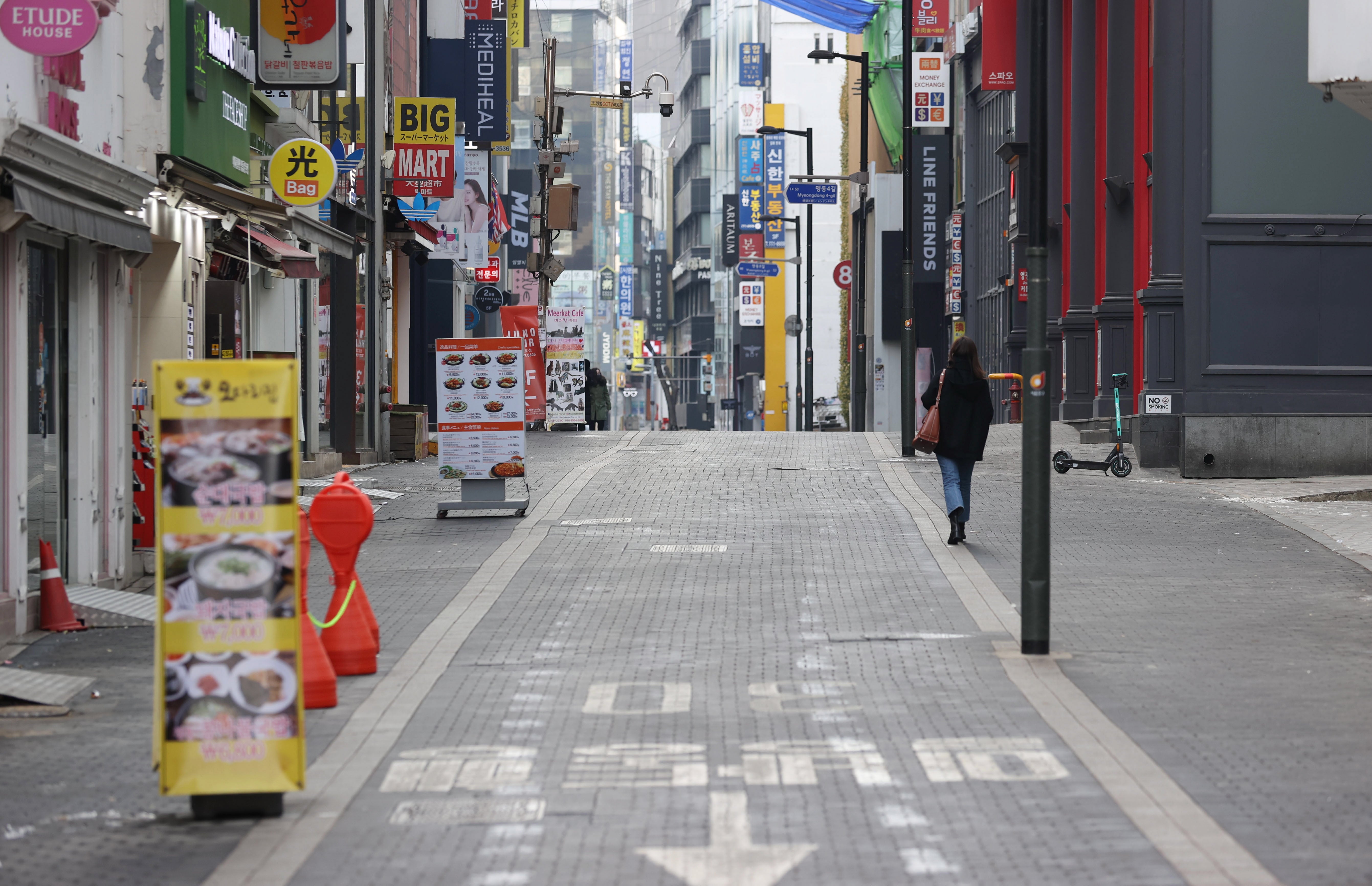Covid news - Hancock predicts ‘happy and free’ summer as UK sees record day for vaccinations
Follow for the latest news as it happens
Your support helps us to tell the story
From reproductive rights to climate change to Big Tech, The Independent is on the ground when the story is developing. Whether it's investigating the financials of Elon Musk's pro-Trump PAC or producing our latest documentary, 'The A Word', which shines a light on the American women fighting for reproductive rights, we know how important it is to parse out the facts from the messaging.
At such a critical moment in US history, we need reporters on the ground. Your donation allows us to keep sending journalists to speak to both sides of the story.
The Independent is trusted by Americans across the entire political spectrum. And unlike many other quality news outlets, we choose not to lock Americans out of our reporting and analysis with paywalls. We believe quality journalism should be available to everyone, paid for by those who can afford it.
Your support makes all the difference.The UK will face a tough few months before enjoying a “happy and free” summer, Matt Hancock said as a record 600,000 people received their first vaccine dose in a day..
“I have a high degree of confidence that by then the vast majority of adults will have been vaccinated,” the health secretary said. So far nearly nine million people have been given a first dose.
It came as the government sought to de-escalate tensions in its row with the European Union over the supply of Covid-19 vaccines, even offering to “help” Brussels amid the ongoing pandemic.
Ministers expressed confidence that the European Union will not block vaccines entering the UK and two sides agreed to a “reset” in relations.
Michael Gove, the Cabinet Office minister, said on Saturday that the EU recognises it “made a mistake” and Dominic Raab, the foreign secretary, said he was “reassured the EU has no desire to block suppliers fulfilling contracts for vaccine distribution to the UK”.
After emergency talks between Boris Johnson, Irish premier Micheal Martin European Commission president Ursula von der Leyen, Mr Gove said vaccines from Pfizer and AstraZeneca are expected to be supplied to the UK as planned.
- Gove strikes conciliatory note with offer to ‘help’ EU in coronavirus vaccine supply row
- Social distancing ‘may be in force until 2022’, Sage study suggests
- I’m a Covid vaccinator and thousands of doses are being thrown away every day – it’s an outrage
- Labour warns one in three hospitality businesses fear collapse before lockdown ends
- The EU vaccine disaster has played into Boris Johnson’s hands
Irish taoiseach: Strong sense across Europe AstraZeneca has not delivered commitments
Taoiseach Micheal Martin also said there is a “strong sense across Europe” that AstraZeneca has not delivered on commitments around the vaccination.
“There’s a very fair point there which cannot be brushed aside, the problem is the commission took the wrong mechanism in invoking Article 16 of the Protocol to deal with it,” he told The Andrew Marr Show.
"What has gone wrong is clearly that the commitments made in terms of volume levels are not being realised in terms of the contractual engagement between the commission and AstraZeneca.
“The same type of tensions do not appear to have arisen in relation to the other companies.”
No disruption to vaccines being supplied to UK from within EU, Truss says
Liz Truss has said there will be no disruption to Pfizer vaccines being supplied to the UK from within the EU.
Asked if she could absolutely guarantee the Belgium-made Pfizer jabs would not be disrupted, she told The Andrew Marr Show: "Yes, I can.
"The prime minister has spoken to the president of the European Commission, she has assured him that there will be no disruption of contracts that we have with any producer in the EU.”
Vaccine supply row huge wrong step for EU, Hunt says
Jeremy Hunt, the former health secretary, has said it was a “huge wrong step” for the EU to have triggered a provision in the Brexit deal to control vaccine exports.
“It (the EU) got it completely wrong and I think the government is being very wise to lower the temperature in a situation like this,” he told Sophy Ridge on Sunday.
“Because this year the big threat, which is not something many people predicted, is around these new variants, particularly from South Africa and also Brazil.
“If we are going to tackle these new variants, and they could happen to be South Africa and Brazil this time, could be anywhere else next time, we are going to need to have high levels of close cooperation and collaboration across the world.
“We all know the problems that happened because we didn’t find out about the virus in China as quickly as we might have, so we really do need to be working closely with everyone and we have the capacity to do that in this country with our world-beating genomics capacity.
“That’s why I think this was a huge wrong step for the EU to take, but I think it’s very welcome that it's been resolved.”
Hunt: Very compelling case for prioritising teachers, but we must heed scientific advice
Zimbabwe has $100m to buy vaccines, paper says
Zimbabwe has set aside $100m (£72m) to acquire Covid-19 vaccines but the government is still waiting for its scientists to recommend which type to buy, a state-owned newspaper reported on Sunday.
President Emmerson Mnangagwa’s government, which is grappling with an economic crisis and acute shortages of foreign exchange, has been criticised for being too slow to announce its vaccination plans.
George Guvamatanga, the ministry of finance secretary, told the Sunday Mail that the government would use funds from a 2020 budget surplus and reallocate some of this year's budget to buy the vaccines.
Finance minister Mthuli Ncube said in November that a budget surplus was expected for 2020, although final figures have not yet been published.
“The government has set aside US$100m for the vaccines to procure around 20 million vaccine doses to immunise 60 per cent of the population, which will help us attain herd immunity,” Mr Guvamatanga said, adding that the government was awaiting advice from scientists on which vaccine to buy and where to procure it.
Mr Guvamatanga could not be reached for further comment.
Zimbabwe, with a population of about 15 million, has seen a surge in coronavirus cases. More than half of its total 33,273 infections and more than two-thirds of the country’s 1,193 deaths have been recorded this month alone.
The country’s health system has been crumbling for years and is now struggling to cope with the spike in cases. Among those who have died in recent days were two cabinet ministers, a retired general and other high-ranking officials.
Anger among overwhelmed medics is adding to broader public dissatisfaction with Mr Mnangagwa, who pledged an economic revival after he took over from the late Robert Mugabe following a coup in 2017.
Belief in Covid conspiracies linked to low vaccine uptake
People who are unlikely to take the coronavirus vaccine are associated with beliefs in conspiracy suspicions about the virus, a study suggests.
Around 15 per cent of the public believe public authorities are involved in a cover-up of important information surrounding Covid-19, according to the research.
This rises to 42 per cent among those who say they are unlikely to, or definitely will not, get vaccinated against the virus, the study by the University of Bristol and King’s College London found.
Our reporter Daisy Lester has more on this:

Belief in Covid conspiracies linked to low vaccine uptake
Research suggests 15 per cent of the general public believe public authorities are covering up important information about the virus
Malaysia reports 5,298 new coronavirus cases and 14 deaths
Malaysia has reported 5,298 new coronavirus cases, raising the total number of recorded infections to 214,959.
The health ministry also reported 14 new deaths, bringing total fatalities from the pandemic to 760.
Anti-vaccine protesters temporarily shut major US vaccine site
One of the largest vaccination sites in the United States briefly shut down on Saturday afternoon because maskless, anti-vaccine protesters blocked the entrance, officials said.
For nearly an hour, thousands of motorists in line to get a coronavirus vaccine at Dodger Stadium, Los Angeles, were stalled as about 50 people demonstrating against immunisation efforts caused officials to temporarily close the site’s gates, Los Angeles Fire Department spokesman David Ortiz said.
The protest had no impact on the number of jabs given on Saturday at the site, which can vaccinate 8,000 people a day, Mr Ortiz said.
Reporter Meryl Kornfield has the full story:

Anti-vaccine protesters temporarily shut down major coronavirus vaccine site
'Please refrain from wearing Trump/MAGA attire as we want our statement to resonate with the sheeple’, a social media post for the planned demonstration said
South Korea to extend Covid curbs into Lunar New Year holidays

South Korea will extend its social distancing curbs by two weeks until the end of the Lunar New Year holidays as new Covid-19 infection clusters emerge in the country, prime minister Chung Sye-kyun said on Sunday.
The announcement dashed earlier expectations that the government would ease the rules from the current highest levels, which include a restaurant curfew and a ban on gatherings of more than four people and have been in place since early December.
But health authorities decided to maintain the curbs after a new large outbreak emerged from missionary training schools across the country last week, reversing a recent downtrend in daily infections ahead of the Lunar New Year break, which begins on 11 February.
“The government is planning to extend the current distancing levels and anti-virus standards as they are until the Lunar New Year holidays end,” Mr Chung told an intra-agency meeting.
“The third Covid-19 wave, which had temporarily slowed, is again threatening our daily lives following the group infections from the missionary institutes.”
In line with the decision, indoor cafe and restaurant dining after 9 pm and any gatherings of more than four people – two key measures that have proved effective – will continue to be banned.
Vice health minister Kang Do-tae said the virus was spreading not only among the missionary schools, to which 379 cases have been linked so far, but also at churches, hospitals and sports facilities.
“There is a danger that it might lead to a broader re-spread of the virus, and potentially another major wave where thousands of patients emerge within a short time,” Mr Kang told a briefing.
But the government will “positively consider” easing the curbs, including the dining curfew, if the situation improves this week.
Mr Chung said the ongoing spread must be further dampened to facilitate South Korea’s vaccination campaign and the start of the spring school semester, which are respectively set for February and March.
About 117,000 doses of vaccines from Pfizer, enough for about 60,000 people, will arrive as early as mid-February via the global distribution scheme Covax, Mr Chung said.
AstraZeneca will also ship its products for about 300,000 people starting February, also through Covax, as the first batch of its shipment of vaccines for at least 1.3 million people and up to 2.19 million in the first half of this year, he added.
The Korea Disease Control and Prevention Agency reported 355 new cases as of Saturday midnight, as the numbers fell under 400 for the first time in five days due in part to less testing during the weekend.

Join our commenting forum
Join thought-provoking conversations, follow other Independent readers and see their replies
Comments